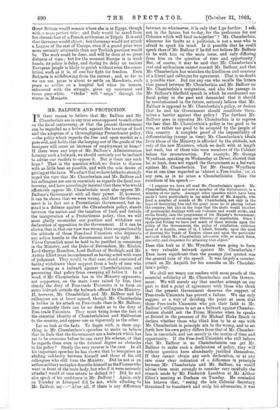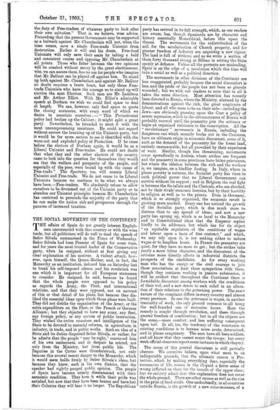MR. BALFOUR AND PROTECTION.
IS there reason to believe that Mr. Balfour and Mr. Chamberlain are in any true sense opposed to each other on the fiscal controversy, or that the present Government can be regarded as a bulwark against the taxation of food and the adoption of a thoroughgoing Protectionist policy, --the policy which regards the free and open market as a pure evil, and holds that theeepine.b out of the goods of the foreigner will cause an increase ofemployment at home ? If there were any hope of Mr. Balfour's Administration forming such a bulwark, we should certainly not be inclined to advise our readers to oppose it. But is there any such hope ? That is the question which we desire to discuss with as little heat as possible, and with the sole desire of getting at the facts. We admit that we have hitherto strongly urged the view that Mr. Chamberlain and Mr. Balfour and his colleagues are one in essentials as regards the fiscal con- troversy, and have accordingly insisted that those who would effectively oppose Mr. Chamberlain must also oppose Mr., Balfour's Government with all their power. If, however, it can be shown that we were wrong, and that the Govern- ment is in fact not a Protectionist Government, but in- stead is a defence against the Chamberlain policy, stands between the nation and the taxation of food, and forbids the inauguration of a Protectionist policy, then we will most gladly reconsider our position and withdraw our declaration of opposition to the Government. If it can be shown, that is, that our view was wrong, then unquestionably the attitude of those Free-food Unionists who deprecate any action hostile to the Government must be right. Mr. Victor Cavendish must be held to be justified in remaining in the Ministry, and the Duke of Devonshire, Mr. Ritchie, Lord George Hamilton, Lord Balfour of Burleigh, and Mr. Arthur Elliot must be condemned as having acted with want of judgment. They would, in that case, stand convicted of having withdrawn their support from a body of men who were acting as a bulwark against Chamberlainism, and preventing that policy from sweeping all before it. In a word, if Mr. Chamberlain has in the Ministry opponents, not supporters, on the main issue raised by him, then clearly the duty of Free-trade Unionists is to form an extra bidwark outside the bulwark offered by the Ministry. If, however, Mr. Chamberlain and Mr. Balfour and his colleagues are at heart agreed, though Mr. Chamberlain is bolder in his attack on Free-trade than is Mr. Balfour, then assuredly there can be no doubt as to the duty of Free-trade Unionists. They must bring home the fact of the essential identity of Chamberlainism and Balfourism to the country, and oppose one as vigorously as the other.
Let us look at the facts. To begin with, is there any- thing in Mr. Chamberlain's speeches to make us believe that he feels that the Government are a bulwark which has yet to be overcome before he can carry his scheme, or that he regards them even in the faintest degree as obstacles to his policy ? Surely the very-reverse is the case. In all his important speeches he has shown that he recognises an abiding solidarity between himself and those of his old colleagues who still form the Ministry. Did he not in an artless military metaphor describe himself as the Pioneer who went in front of the main body, but who if it were seriously attacked would at once return to defend it? Did he not also speak of his confidence in Mr. Balfour ? Again, only on Tuesday at Liverpool did be not, while alluding to Mr. Balfour,' say :—" After all, if there is any difference between us whatsoever, it is only that I go further. I ask, not in the future, but to-day, for the preference fOr our Colonies which will bind us together" ? Mr. Chamberlain; whatever his faults as a politician, is not a man who is afraid to speak his mind. Is it possible that he could speak thus of Mr. Balfour if he did not believe Mr. Balfour to be with him on the main issue, and only differing . from him on the question of time and opportunity ? But, of course, it may be said that Mr. Chamberlain's zeal and enthusiasm cannot commit Mr. Balfour, and that Mr. Chamberlain has mistaken the kindliness and courtesy of a friend and colleague for agreement. That is no doubt a possible view. But can any one who recalls the letters that passed between Mr. Chamberlain and Mr. Balfour on Mr. Chamberlain's resignation, and also the passage in Mr. Balfour's Sheffield speech in which he condemned our fiscal policy in the past and demanded that it should be revolutionised in the future, seriously believe that Mr. Balfour is opposed to Mr. Chamberlain's policy, or desires that he and his Government should constitute them- selves a barrier against that policy ? The furthest Mr. Balfour goes in opposing Mr. Chamberlain is to express the fear that Mr. Chamberlain's policy is too good to be true, or rather too good to be accepted by the people of this country. A complete proof of the impossibility of differentiating (except in time) Mr. Chamberlain's ideals from those of the Ministry is afforded by the attitude, not only of the new Ministers, which we dealt with at length last week, but of those who were members of the Cabinet before the reconstruction. For example, Mr. George Wyndham, speaking on Wednesday at Dover, showed that he, at least, does not regard the Government as a bulwark against Mr. Chamberlain. Yet Mr. George Wyndham was at one time regarded as ' almost a Free-trader,' or, at any rate, as in no sense a Chamberlainite. Take the exordium of his speech "I suppose we have all read Mr. Chamberlain's speech. Mr. Chamberlain, though not now a member of the Government, is a member of our party. Amongst other speeches which have been made I have particularly in my mind that of Mr. Asquith, wlm fired a number of rounds at Mr. Chamberlain, not only in the hope of destroying him and the great issue he is placing before the country, but also in the hope that the shots would ricochet off preferential dealings with our Colonies and would strike, and strike fatally, into the programme of his Majesty's Government, the programme of resuming our liberties of negotiation. Since I spoke last Friday we have had much of these attacks upon the policy of the Government, the policy of retaliation, criticism most of it hostile, some of it, I admit, friendly, upon the need of drawing the bonds of Empire closer and upon the particular methods which Mr. Chamberlain advocates with so much force, sincerity, and eloquence for attaining that object."
Does this look as if Mr. Wyndham were going to form a very valuable bulwark against Mr. Chamberlain ? Even more significant than the passage just quoted was the general tone of the speech. It was largely a counter- attack on Mr. Asquith for his assaults on Mr. Chamber- lain's policy.
We shall not weary our readers with more proofs of the essential solidarity of Mr. Chamberlain and the Govern7 ment. We will merely say that another attempt on our part to find a point of agreement with those who think that the present Government deserves the support of Free-trade Unionists has proved a failure. We can onl7 suggest as a way of deciding the point at issue. that those Free-trade Unionists who pin their faith to Mr. Balfour's willingness to act as a bulwark against Chamber- lainism should ask the Prime' Minister when he speaks at Bristol in the presence of Sir Michael Hicks Beach to declare whether those who think him to be at one with Mr. Chamberlain in principle are in the wrong, and to set forth how his own policy differs from that of Mr. Chamber- lain in essentials, and not merely in the matter of time-and opportunity. If the Free-food Unionists who still believe. that Mr. Balfour is no Chamberlainite can get 1$1r. Balfour to make such a declaration of policy, they will. without question have abundantly justified themselves. If they cannot • obtain any such declaration, or at .any rate some clear indiCation of a difference in principle between Mr. Chamberlain and Mr. Balfour, we would advise them most strongly to consider very carefully the remark made by Mr. Frederick Lambton at Mr. Arthur Elliot's meeting at Durham on Tuesday. He, reminded his hearers that, "seeing the lath_ Colonial, Seretaryi threatened to tomahawk and scalp his adveriarits,lt was the duty of Free-traders of whatever party to look after their own salvation." That is, we believe, wise advice. Pretending that the present Government may be supported as a bulwark against Mr. Chamberlain will not, when the time comes, save a single Free-trade Unionist from destruction. Rather it will seal his doom. Free-food Unionists will only save their seats by taking a bold and consistent course and opposing Mr. Chamberlain at all points. Those who falter between the two opinions will be crushed without mercy by the great electioneerer, who, we can assure them, has no use for people who imagine that Mr. Balfour can be played off against him. To stand up both against Mr. Chamberlain and against Mr. Balfour no doubt requires a brave heart, but only those Free- trade Unionists who have the courage so to stand up will Survive the next Election. Such men are Mr. Lambton and Mr. Arthur Elliot. With Mr. Elliot's admirable Speech at Durham we wish we could find space to deal at length. We can, hOwever, only find space to quote the closing sentences, with every word of which we desire to 'associate ourselves : — " This Protectionist policy had broken up the Cabinet ; it might split a great party. Nevertheless, he intended to meet it with the most uncompromising resistance. He could not regard without sorrow the breaking up of the Unionist party, but it would be far more serious to see it identified with the worn-out and exploded policy of Protection. If he came before the electors of Durham again, it would be as a Liberal Unionist and Free-trader. He could not doubt that when they and the other electors of the country came to lool into the question for themselves they would see that the welfare and prosperity of the people, and especially of the poor, were bound up with the cause of Free-trade." The Spectator, too, will remain Liberal Unionist and Free-trade. We do not cease to be Liberal Unionists because we continue to be what we always have been,—Free-traders. We absolutely refuse to allow ourselves to be drummed out of the Unionist party or to abandon our Unionist principles because Mr. Chamberlain has contrived to persuade the majority of the party that he can make the nation rich and prosperous through the panacea of increased taxation.



















































 Previous page
Previous page